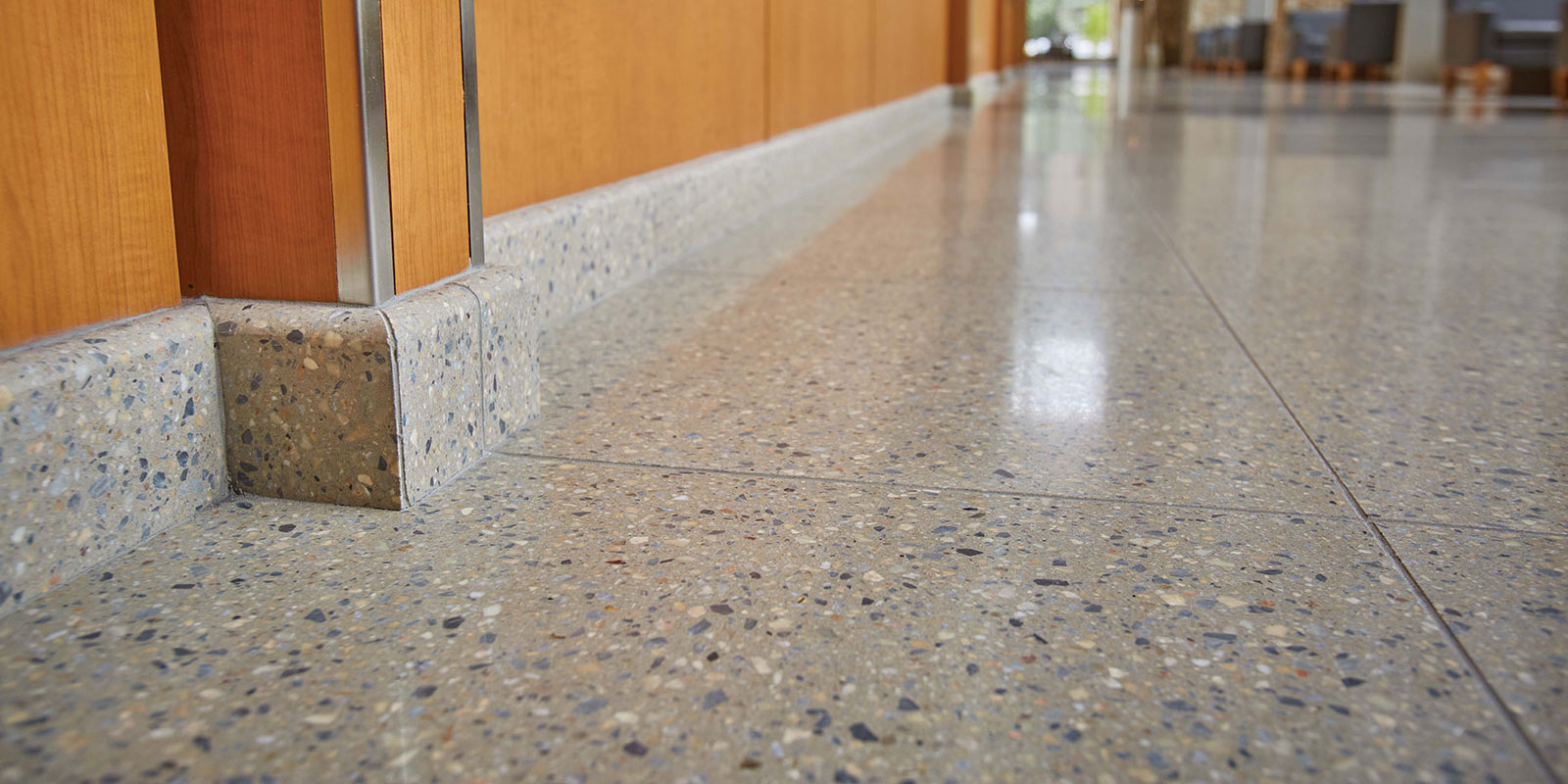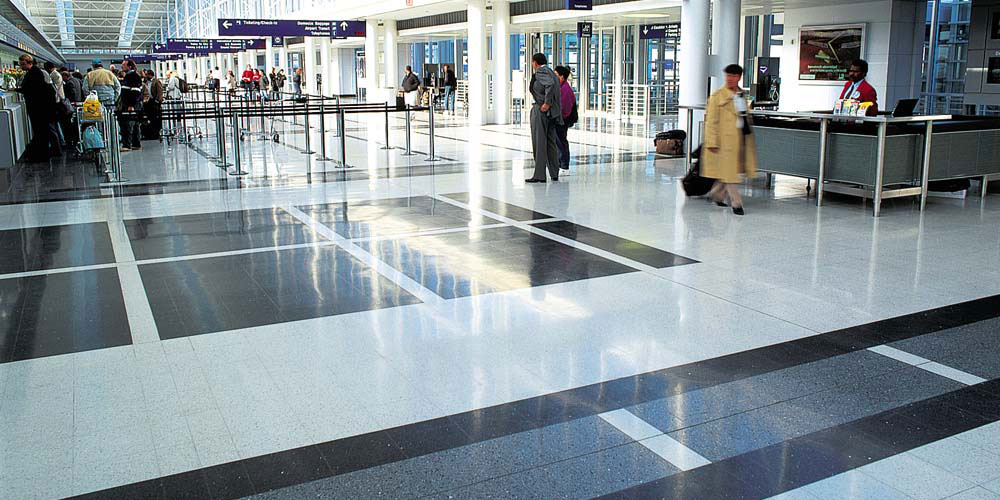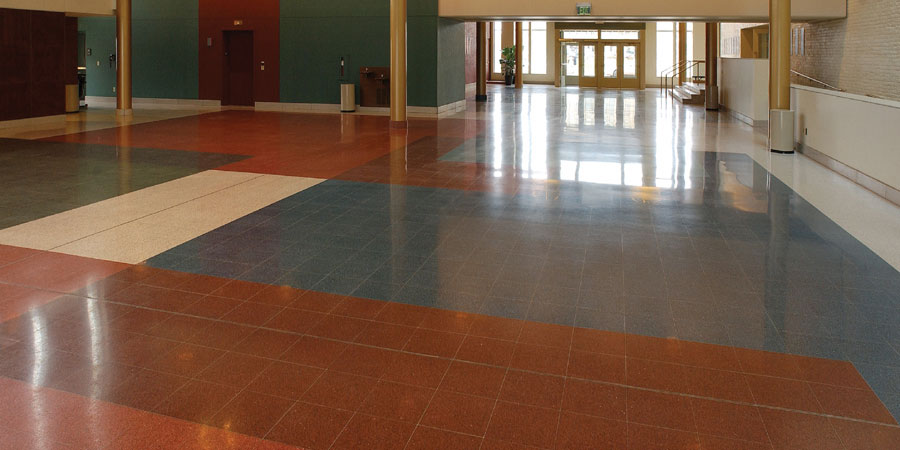What Is the DCOF Rating?
Dynamic coefficient of friction, or DCOF, is used in physics and engineering to quantify the amount of friction between two surfaces in relative motion.
In the flooring industry, DCOF is highly important for determining slip resistance. It’s critical for ensuring safety, mitigating risk and complying with safety standards.
Depending on the type of project, minimum DCOF requirements will apply. Here, we’re analyzing recommended DCOF minimums for certain projects, as issued by the American National Standards Institute (ANSI).

A Brief Overview of DCOF
The coefficient of friction is a dimensionless quantity that represents the ratio of the force of friction to the normal force between two surfaces. It is a fundamental parameter that characterizes the frictional behavior of materials.
In February 2022, ANSI released an updated edition of their "Test Method for Assessing the Dynamic Coefficient of Friction of Hard Surface Flooring Materials,” also referred to as ANSI A326.3. The testing method has become the standard and organizes flooring types into their respective use classification, each with its own recommended minimum DCOF measurement.
Types of Flooring and Flooring Materials That Are Tested For DCOF
Most flooring undergoes a DCOF test to test traction and tile slip resistance. The following are common materials that are tested:
Floor tile: This includes any tiled walking surface, such as ceramic tile floors (glazed and unglazed), porcelain tile, mosaic tile, quarry tile, and more.
Natural stone: Including granite, limestone, travertine, and marble flooring.
Vinyl flooring:Including vinyl tiles and sheets.

Why DCOF Is Important
The dynamic coefficient of friction and other tribological properties are relevant for architects for multiple reasons, each of which can influence material and design choices.
Material Selection
Understanding the frictional behavior of materials is crucial when selecting finishes and surfaces for different projects. For example, when choosing flooring materials, architects may consider the coefficient of friction to ensure that the surface is slip-resistant and safe for anyone walking on the floor when the project wraps.
Safety Considerations
Slippery surfaces in areas like staircases, ramps or entrances can pose significant safety hazards. Being aware of the frictional properties of materials is necessary to design spaces that minimize the risk of slips and falls. This is particularly important in public buildings, commercial spaces and residential areas where foot traffic may be high.
Durability and Maintenance
Knowledge of how materials wear and interact under frictional forces plays a large part in predicting the durability and maintenance requirements of different architectural elements, particularly flooring. Knowing how different flooring choices will wear and behave over time helps you make better material decisions that take the longevity and performance of surfaces into account.
Accessibility
Accessibility is a major factor in architectural design. Different jurisdictions have unique standards that developers must consider and adhere to when designing and completing projects.
When designing ramps or accessible pathways, for example, it's imperative to consider the coefficient of friction to ensure that surfaces meet such accessibility standards.
Environmental considerations
In outdoor spaces, architects may consider the impact of environmental factors such as rain or snow on the frictional properties of surfaces. This is important for designing outdoor areas that are safe and functional under various weather conditions.
DCOF, Not To Be Confused With Static Coefficient of Friction (SCOF)
SCOF is another measurement of friction; however, it’s used to determine the frictional resistance of an object starting into motion, whereas DCOF measures the amount of force required to keep an object in motion.
While both are related to slip resistance, there are some key differences. Here’s a brief comparison:
SCOF testing conditions: The test is typically conducted under dry conditions, and the SCOF is determined by measuring the force required to start the sliding motion.
DCOF testing conditions: DCOF testing often considers both wet and dry conditions to simulate real-world scenarios. Wet DCOF is particularly important as it assesses slip resistance on surfaces exposed to water or other liquids.
A couple of key differences to note include:
State of motion during testing: SCOF is related to static conditions, while DCOF is related to dynamic or in-motion conditions. For example, SCOF is concerned with the force required to initiate sliding when surfaces are stationary, while DCOF measures the frictional force during ongoing motion.
Testing conditions: DCOF testing often includes assessments under both dry and wet conditions, as slip accidents are more likely to occur on wet surfaces. SCOF testing is typically conducted in dry conditions only.
In recent years, DCOF has gained more prominence in standards and regulations for slip resistance, as it is considered more reflective of real-world scenarios where surfaces may be wet or contaminated.

How Is DCOF Tested?
Most commonly, DCOF testing is completed using a device called a tribometer, which is designed to measure frictional forces between two surfaces. This device simulates and quantifies the interactions between two surfaces in relative motion, acting as a quantifiable slip test.
Selecting the Right Flooring To Maximize Safety
It’s important to note that the minimum recommended DCOF values for each scenario are just that — minimum recommendations. Slip hazards are still possible on floors that achieve only minimum requirements.
That said, there are other solutions available that can help reduce the chance of slip and fall injuries, such as tile treads. These abrasive strips are available in custom colors to complement any design style and are an effective way to improve shoe grip on slick surfaces.
When purchasing tile, care should be taken to verify DCOF ratings to ensure your selections are suitable in certain environments.
Have specific DCOF requirements for your project? Contact Wausau Tile today to chat with an expert.